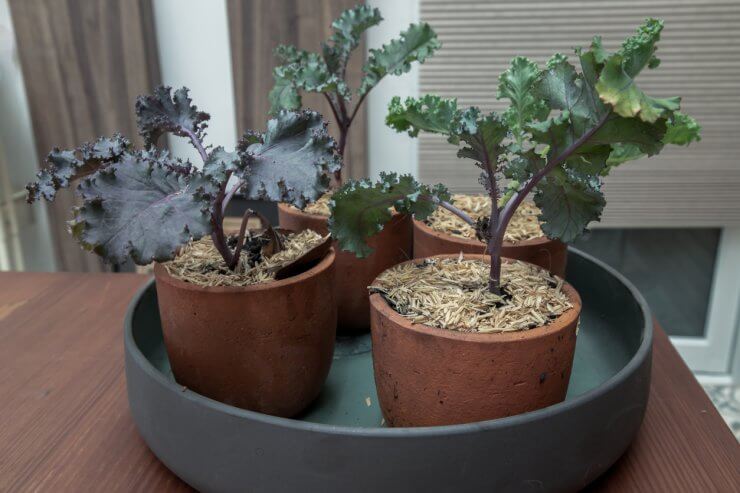
Kale plants growing inside in containers
Kale is a great candidate for container gardening. It’s a prolific plant, but you should choose a cultivar that’s the right size for your space and have the kale close at hand while you’re cooking.
Light
Kale needs six to eight hours of direct sunlight a day. Pick a sunny spot with southern exposure. If you have your container on wheels, it will be easier to reposition your plants when you need to.
If you’re really fond of kale, especially in salads, you can reseed your containers throughout the season to keep those salad greens coming. Just keep your container in a sunny spot.
If you have a particularly short growing season or you’re short on outdoor space, you can grow kale indoors using grow lights. LED grow lights are effective, efficient, and they don’t throw off heat like some other grow lights. And since kale likes cooler weather, a corner in the basement would do just fine.
Water
An inch of water a week will keep your kale happy; just be careful not to overwater. Check your soil weekly by poking a garden trowel into the soil; there are even some garden trowels with inch markings on them to help make your gardening easier.
If the soil is only moist for an inch or two, your plants are thirsty! Try to be consistent in your watering; cycles of too much/not enough water will stress out the plants. When kale is stressed, it produces chemicals that change the taste of the kale—for the bitter, not the better.
Soil
Use fresh, packaged garden soil for your containers. You can amend the soil with well-rotted manure or compost. Don’t use fresh manure; it could contain harmful bacteria, weed seeds, or other surprises.
When your plants are about 4 inches tall, you can give them a little fertilizer formulated for garden plants. Kale is one of the exceptions to the nitrogen rule; since the plant’s only job is to produce leaves, kale loves nitrogen. If there are no specific instructions for container-grown plants, mix the fertilizer at half the recommended strength.
Whatever you do when you’re getting fertilizer, don’t ever get any fertilizer that has a weed killer; this product is commonly called “weed and feed.” It could kill your plants.


 Previous
Previous

